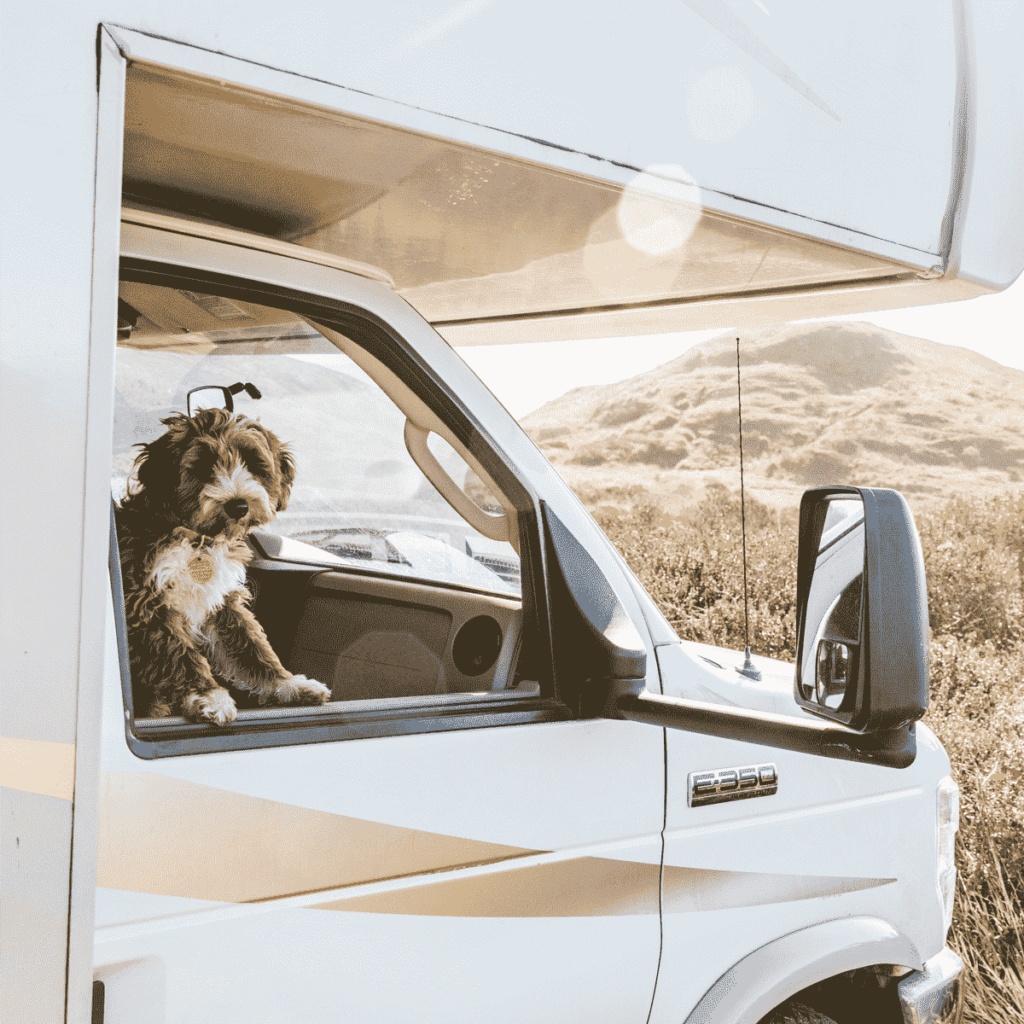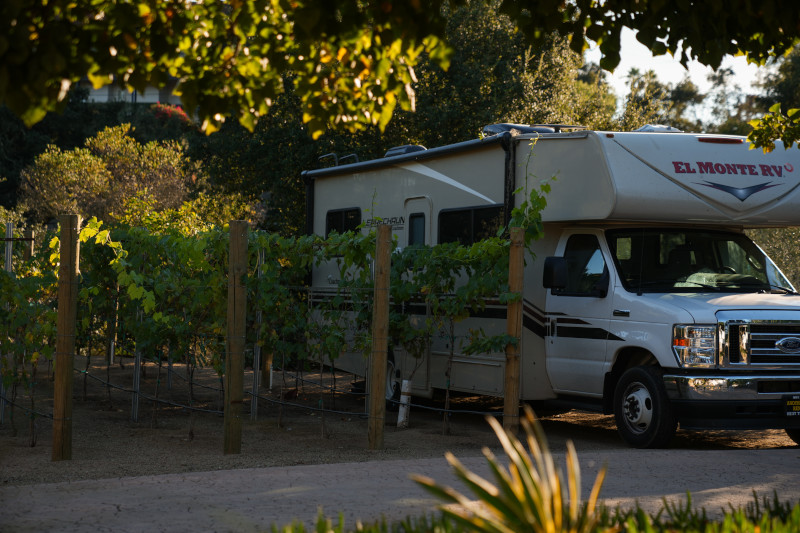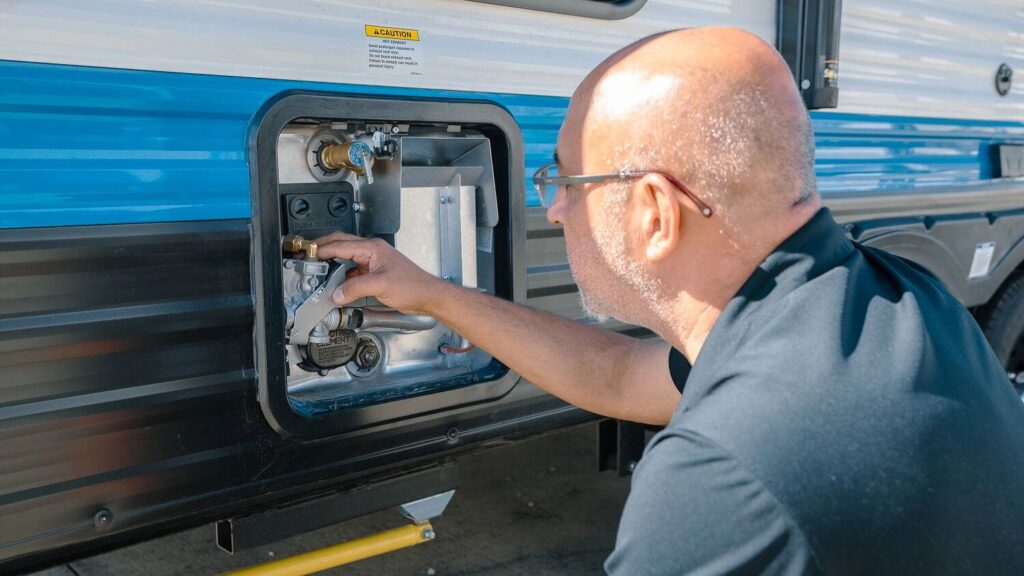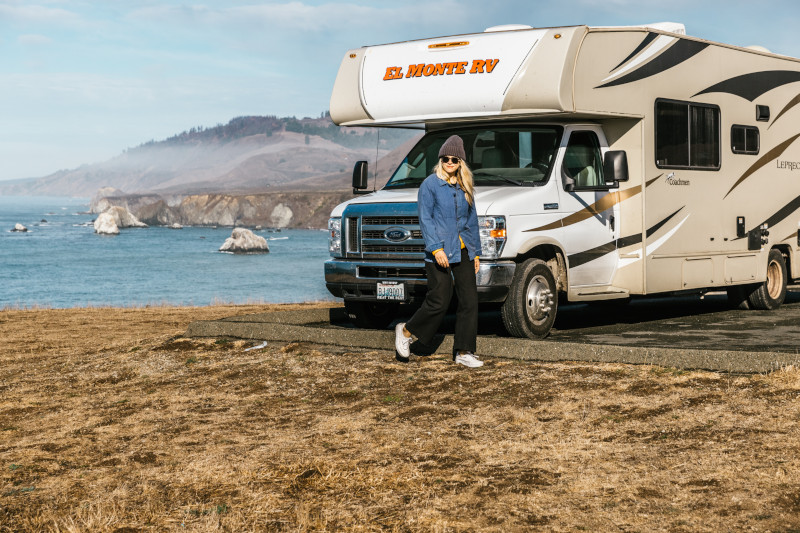Storing your RV for the winter, when you know you won’t be using it very much is not that difficult. However, it takes proper planning and a bit of common sense to store your RV properly and not come back to it in the spring needing costly repairs.
Some carefully thought out steps now will save you loads of headaches and dollars later. So, take the time to prepare your RV for storage and make sure you follow some of these well-learned tips from fellow RV’ers.
(A) Winterizing an RV is something all RV’ers will tell you they do.
Winterizing is actually much more than putting anti-freeze in your RV’s water system. Batteries, ventilation, bugs, sealant, fuel and numerous other components need to be considered when preparing your RV for storage.
- If possible, store your RV in a covered storage facility. Avoid trees and grass. Ensure that the RV cover you use for storage is breathable to prevent mold and mildew from growing. Inflate and cover your tires to protect them. If you do not move the vehicle or the tires, every so often you will get a big flat spot when you eventually return to your vehicle.
- Make sure that all blinds and window covers are down. This will protect your furniture from the sun’s rays. They also act as a third barrier in case a rodent finds its way past your cover and window. This is a good time to check for any cracks or tears on your window covers and repair them.
- Turn the main LPG supply valve off. Cover any vents that may attract or allow insects to crawl into your vehicle.
- Clean it up well. It may seem counterproductive, but before you store it, give your RV a good wash and wax. The RV wax will help protect your RV from sun damage and keep the dirt from building up. This makes clean-up after storage much less stressful and less time consuming. Once it is clean, take a good look at all the silicon seams, caulking and rubber seals. Repair any cracking or peeling (try an RV sealer) to ensure there are no leaks or ways for insects to make your RV their home.
- Remove all perishable items from the RV and open all drawers and cabinets. After you have defrosted your refrigerator and cleaned it, put some baking soda in it; then leave the door open. This will prevent odors from developing.
- Make sure you have good ventilation. You don’t want to open the door to a moldy, musty smelling RV. Not a great way to start a vacation. A great suggestion is to leave the roof top vents open if you can. With the right RV vent covers, you will get the air circulation you need without the moisture.
(B) RV Chassis preparation for storage
- Take out your battery and store it. Always take off the negative terminal first. Alternatively, see below about storing your RV with the battery cables off, or keeping it charged with a solar charging system
- Check your battery every month and ensure it stays as close to fully charged as possible to prevent freezing.
- You will need to add fuel stabilizer to your RV while it is in storage. Put fuel in the vehicle and add the stabilizer. Run the engine so that this fuel can circulate in the system. Then, some say to be sure to start your engine every two months and let it run on idle for at least two hours. Better to drive it if you can, and do a few errands, but if it is stored away from your home, this may not be practical. Do the same for your generator.
- Change the oil before storing your RV. Your radiator should also contain the proper amount of anti-freeze. Drain and flush this system; then refill it every 2 years. Your owner’s manual should tell you which type of anti-freeze is suitable for your specific vehicle.
If all the above is done, you can be sure that when you come back to your RV in the spring ready to hit the road, you will have very few worries.
(C) Where do I store my RV?
RV self-storage facilities give RV owners space to store their vehicles if this is not possible at home. Self-storage facilities are available all across the country. RV storage facilities are great options for part time RV’ers but there are certain considerations one must make before storing their RV.
Should I cover it? Without a doubt a covered RV storage unit is a much better option than an uncovered one. RV covered storage units cost more, but this cost will seem lower when you compare it to the cost of repairing all the damage than may occur during the months that you will be away.Rodents can chew through wiring and plastic and can get in through the smallest openings. They also love to spend the winter in the warm comfort and safety of your RV.
Where else could I leave my RV? – If you are a full-time RV’er and wish to take off for a few weeks or a month, these are other options you may want to consider for parking your RV while away.
- A Friend’s Property – If you are lucky enough to have friends who have RV parking at their place, this is an excellent way to store it and you will know there is someone who can keep an eye on it.
- RV Parks – If you’re just heading out for a few days or a couple weeks, you might just pay for an RV Park with electrical hook-ups and leave your RV there. You can get a monthly spot and use the location to pack for your journey via some other means of transportation beforehand, and come back to your RV home afterwards. The monthly rate, as opposed to daily, make this an affordable option.
- RV Storage Lots – For longer term, finding an RV storage lot can be a solution. For usually under $100/month you can find lots ranging from big open fields to enclosed buildings. Look around carefully and go with something you trust and feel safe with. Being sure that the facility is monitored with 24-hour surveillance cameras is a very good idea.
- RV Repairs & Maintenance – When you need to go away, leaving your RV in the hands of a RV shop to catch up on maintenance or tackle projects can be a great solution that kills two birds with one stone. Even if your job only needs a few days’ work, some shops can be quite flexible with you leaving it for longer – knowing they can fit the work in as their schedule allows. Of course, this isn’t necessarily a cheap storage option.
(D) Other things to Consider when Storing your RV
The RV should be parked as level as possible. If you do have a slope, keep the fuel tank at the lower end so the fuel doesn’t shift toward the engine end. It’s also better to store it fairly level just in case you should have to use it as a guest house, a quiet nap, run the refrigerator (propane fridges should be level as to not cause damage) before a last-minute trip or in case someone has to stay in it during an emergency situation. You may not want to or be able to move it to a more level spot at the last minute.
Use leveling blocks or landscaping when storing your RV. Do not use hydraulic jacks in storage. They may leak, malfunction or get stuck in the up position. That is not a problem that you want to have if you can avoid it.
As discussed above, disconnect and remove your battery to prevent slow voltage drains. Even with everything shut off per manufacturers’ instructions, there is usually some kind of tiny drain that will kill your battery over time. It’ll happen even faster in freezing temperatures. Even with everything “off” batteries can die in a month of winter. You can manually disconnect it or install a battery switch, which you can buy at most auto parts stores to make this easier. There are also devices such as “Priority Start” that will monitor your voltage and just disconnect the battery automatically so you always have enough juice to start the engine.
RV covers may not be worth it. They are expensive. They rip easily and may cause more damage flapping in the wind against an antenna or your paint job. The other issue is that they seem to attract rodents, bees and birds. If they can find a way to get under it and use it for protection from the weather, they will. And they will provide you with an unwelcome surprise when you uncover your RV.
You don’t need to go out and start the engine every couple of weeks. This isn’t necessary or good for your engine or transmission unless you are actually driving it. If you can drive it to the grocery store or on errands once in a while, great. If not, you are better to use an automatic battery charger and charge all your batteries individually. The best solution is probably to install a solar panel to keep your batteries topped off.
Lock it up! Curious neighbor kids, bored teenagers, and people that are up to no good are a threat to a perfectly tucked in RV. A great way to secure your RV better than the locks that came on it is to invest in a lock that goes around the kingpin. Pad locks and cylinder locks are great options. Here is a great guide to securing your RV.
Remember to consult your El Monte RV Sales representative for help with deciding where and how to store your RV and to get answers to many of your other RV questions.



